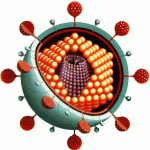Virology
|
15 january 2016 04:04:28 |
| Identification and spontaneous immune targeting of an endogenous retrovirus K envelope protein in the Indian rhesus macaque model of human disease (Retrovirology) |
|
Tweet Background:
Endogenous retroviruses (ERVs) are remnants of ancient retroviral infections that have invaded the germ line of both humans and non-human primates. Most ERVs are functionally crippled by deletions, mutations, and hypermethylation, leading to the view that they are inert genomic fossils. However, some ERVs can produce mRNA transcripts, functional viral proteins, and even non-infectious virus particles during certain developmental and pathological processes. While there have been reports of ERV-specific immunity associated with ERV activity in humans, adaptive immune responses to ERV-encoded gene products remain poorly defined and have not been investigated in the physiologically relevant non-human primate model of human disease.FindingsHere, we identified the rhesus macaque equivalent of the biologically active human ERV-K (HML-2), simian ERV-K (SERV-K1), which retains intact open reading frames for both Gag and Env on chromosome 12 in the macaque genome. From macaque cells we isolated a spliced mRNA product encoding SERV-K1 Env, which possesses all the structural features of a canonical, functional retroviral Envelope protein. Furthermore, we identified rare, but robust T cell responses as well as frequent antibody responses targeting SERV-K1 Env in rhesus macaques.
Conclusions:
These data demonstrate that SERV-K1 retains biological activity sufficient to induce cellular and humoral immune responses in rhesus macaques. As ERV-K is the youngest and most active ERV family in the human genome, the identification and characterization of the simian orthologue in rhesus macaques provides a highly relevant animal model in which to study the role of ERV-K in developmental and disease states. |
| 106 viewsCategory: Virology |
 Enhancement of HIV-1 infection and intestinal CD4+ T cell depletion ex vivo by gut microbes altered during chronic HIV-1 infection (Retrovirology) Enhancement of HIV-1 infection and intestinal CD4+ T cell depletion ex vivo by gut microbes altered during chronic HIV-1 infection (Retrovirology)Glycosylation of the HIV-1 Env V1V2 loop to form a native-like structure may not be essential with a nanoparticle vaccine (Future Virology) 
|
| blog comments powered by Disqus |
MyJournals.org
The latest issues of all your favorite science journals on one page
The latest issues of all your favorite science journals on one page



